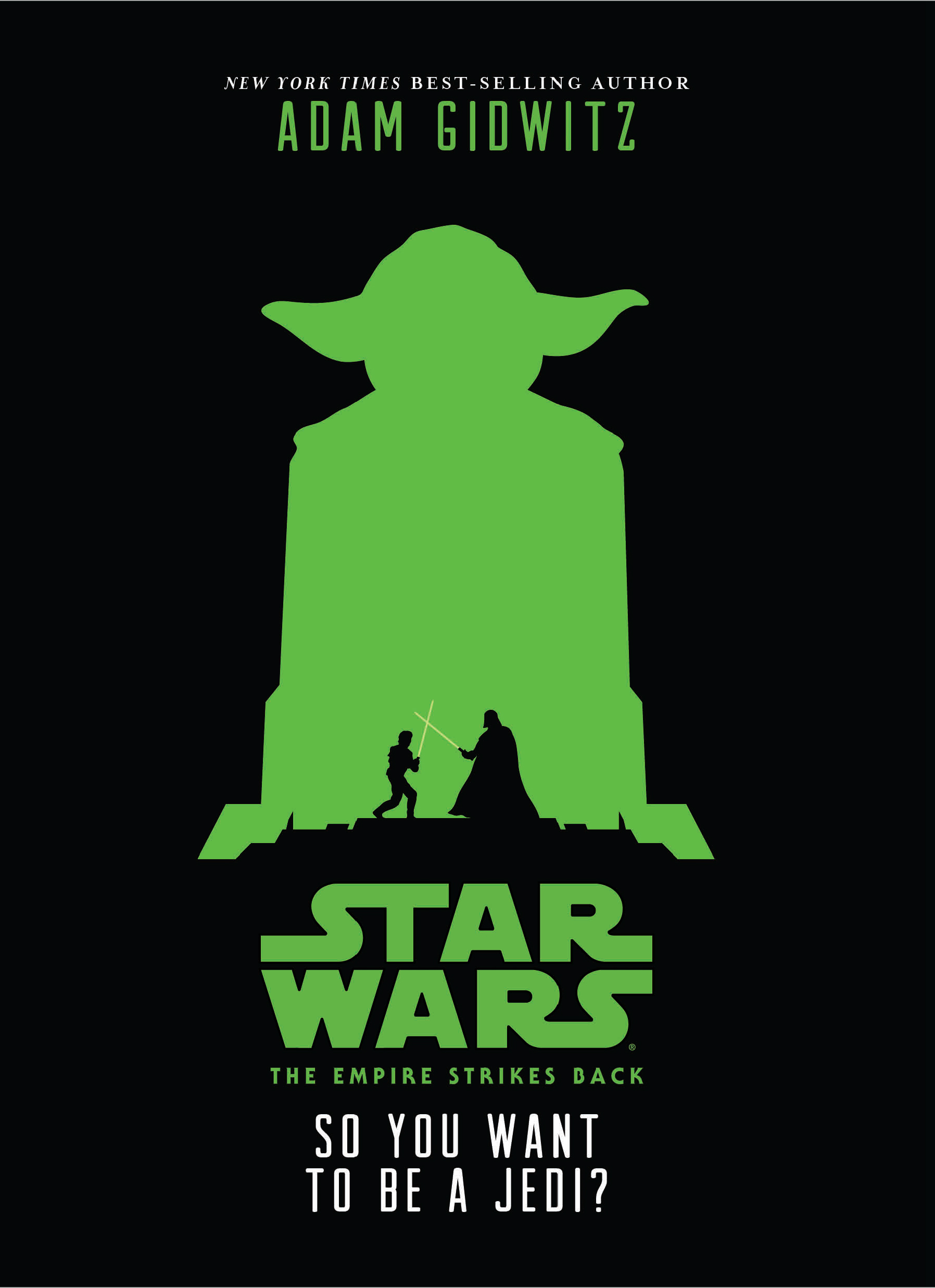With recent events leading to a backlog of recorded episodes and episodes to record very soon, Star Wars Beyond the Films‘ Nathan P. Butler will be posting short, non-spoiler reviews for new releases. Spoiler-filled discussion will follow in the weeks thereafter on the podcast. (In the case of minor releases, that discussion may be kept for a Year in Review series of episodes.)
So You Want to Be a Jedi? by Adam Gidwitz (hardback, 2015)
Preface (Found on My Reviews for All Three of the New Novelizations)
Novelizations for Star Wars have been a mixed bag over the years, an oddity in Star Wars publishing. In 1976, 1980, and 1983, the novelizations of the Original Trilogy were released. They did not expand upon the films they adapted to any large degree, and they were plagued by being based on scripts with stories and characters yet unseen, leading to plenty of inconsistencies between the films and the novelizations.
The same inconsistencies could be found in the Prequel Trilogy novelizations in 1999, 2002, and 2005, but as time went on, writers became bolder in adding to the films they were adapting. Attack of the Clones provided a look into Shmi Skywalker’s activities and capture prior to the film, while inadvertently (or on the sly?) giving the Legends continuity a hint as to Anakin’s birthdate within his birth year. Later, Matthew Stover’s Revenge of the Sith novelization went so deeply into character motivations (especially those of Anakin Skywalker in relation to why not being a Jedi Master when on the Jedi Council was more than just an insult but a barrier to saving his wife) that it prompted me to eventually coin the “Stover Effect” – when an adaptation of a story provides so much more detail on that story that the overall qualiity of the story is raised. (For years, I have considered Revenge of the Sith one of my two favorite Star Wars films, less for what Lucas put on film and more for how the story is so much deeper with the background and intricate details that Stover added to its context.)
As the years (then decades) have gone by, there have been frequent calls to release new, updated novelizations of the films in order to make them more true to the films and help them adhere to new context provided by other works, such as The Clone Wars or simply the other films themselves. That has never taken place for the adult novelizations, but we have seen very young reader books from Scholastic that tried to be more accurate to the films than their adult counterparts.
Now, in 2015, shortly after Force Fiday, a new trio of Original Trilogy novelizations has joined the Story Group’s Canon, and they are offbeat to say the least.
The three new novelizations are The Princess, the Scoundrel, and the Farm Boy (for A New Hope), So You Want to Be a Jedi? (for The Empire Strikes Back), and Beware the Power of the Dark Side! (for Return of the Jedi). Each is geared toward somewhat younger readers (big print and all), wrtitten by an established author for younger readers, and includes illustrations by Ian McCaig. These new novelizations each take an unusual approach in an attept to retell the stories of these films in a fresh way.
That being said, let’s take a look at the specific book in this series for this review . . .
So You Want to Be a Jedi?
If Alexandra Bracken’s take on A New Hope took an offbeat approach by simply shifting perspectives, Adam Gidwitz’s take on The Empire Strikes Back, entitled So You Want to Be a Jedi? defies the term “offbeat” and ventures into “What the heck am I reading?” territory.
Gidwitz is best known for his take on fairy tales and, as such, it is little surprise that the has applied a similar approach to how he has reimagined classic fairy tales for modern audiences to ESB. That will either be a welcome oddity for Star Wars fans or outright blasphemy, possibly in equal measure.
The book is written from the perspective of our modern day, telling the story of ESB as if it really happened “a long time ago in a galaxy far, far away,” rather than as fiction. The narrator speaks mostly in second person (i.e. you do this, you do that, etc.) and present tense, casting the reader in the role of Luke Skywalker. When Luke acts in the film, it is “you” acting in the book. (When dealing with non-Luke scenes, the story is somewhat in third person present tense).
The narrator is attempting to teach the modern day “you” lessons in how to become a Jedi (philosophically at least) by telling the story of how the Luke Skywalker “you” dealt with the challenges of ESB. Along the way, the story is broken up by short activities for the reader to complete, such as lessons in meditation, seeing things from others’ perspectives, etc.
The approach is an unusual one, and it takes some getting used to, but putting the reader into Luke’s mindset provides some interesting insights (though somewhat few and far between) into Luke’s character, which Gidwitz asserts was not developed much on-screen in the films due to being the hero of a modern fairy tale, into which we are to pour ourselves as an audience.
The short lessons are also interesting in that they can actually be carried out by the audience, making it something that can more actively engage a young reader than simple prose fiction.
However, those looking for what amounts to an adaptation of The Empire Strikes Back that adds characters and scenes to the Story Group’s Canon will likely be disappointed. The book cannot be taken seriously as canonical due to both its perspective from modern day and the fact that the narrator relates the story in a way that constantly changes dialogue, ignores parts of the film (especially the “mushy” stuff that the narrator announces that he will be skipping for lack of relevance to Jedi training), and sometimes just mangles film scenes. For instance, Leia and Han’s “I’d just as soon kiss a Wookiee” scene cuts their banter almost entirely and is then merged with Han learning that Luke has not returned in a bizarre scene that feels unnecessarily combined and untrue to the film. This does not happen often, but it happens enough to be jarring, and the dialogue and scene specifics overall stray quite a bit farther from the source film than in most other Star Wars adaptations.
The narrator’s tone is quirky and often amusing, but it will not be something everyone will enjoy. Some will find it jarring. For me, I found it strange until I pictured the current Doctor (of Doctor Who), Peter Capaldi, as the narrator, reading it as if the Doctor was telling the story. That made the quirkiness work, though I still had to imagine that the Doctor had seen ESB years ago and only vaguely remembered the story but was telling it to someone who had never seen ESB, so he figured “hey, even if I get it wrong, they’ll never know the difference.”
Yeah . . . definitely not for everyone.
That said, if you can get over the extreme ideosyncracies of the book and just enjoy it as “some wackjob’s take on ESB” (or perhaps ESB as told by George Carlin’s Hippy-Dippy Weatherman, “live with the hippy-dippy weather, man”), then it can be an enjoyable read.
Every so often there will even be a glimmer of something that sparks your imagination, as happened to me when Gidwitz describes Vader’s reaction to losing the Falcon (and Luke) at the end of the film as not frustration, disappointment, or defeat, but in terms of sadness at his son having rejected him and fleeing from him. I had never looked at it that way in all of the decades I had been watching the film.
The Verdict
So You Want to Be a Jedi? is The Empire Strikes Back on drugs. It is weird enough to be enjoyable if we can accept it for what it is trying to do, but fans looking for a “true” adaptation or something that can readily be considered part of the saga must look elsewhere.
Recommended for: Those who can picture the 12th Doctor telling the story of Luke in ESB after having seen the film years ago to someone who has never seen it and thus cannot tell when details are way off.
Not recommended for: Those seeking what one might call an “accurate” adaptation of The Empire Strikes Back.
No review copy was provided for this publication. It was a standard retail purchase.

